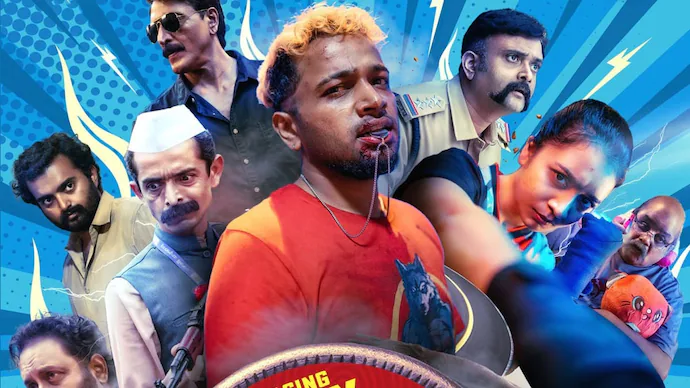The film isn’t consistent and the wild tonal shifts are sometimes puzzling. But none of that matters, because the jokes keep coming. The rest of this review may contain spoilers.
I’ll begin with two scenes from Maranamass. The first one is set around the eve of a birthday. An excited Jessie (Anishma Anilkumar) is in her room, waiting for the clock to strike 12. On the one hand, we have a man who loves her. His name is Luke, and he’s played by Basil Joseph. He has brought flowers and balloons for the occasion, and he is waiting outside the gate. On the other hand, inside the house, we get Jessie’s father and her grandmother, who has a more practical approach to gift-giving. The older woman gives Jessie a can of pepper spray, because “we girls need to protect ourselves.” Will Jessie meet Luke and have a romantic night, or will she take the pepper spray and go to sleep? All I will say is this. The scene ends with Luke’s image, as these words appear: “Sad Superstar” Basil Joseph. It’s a spoof on how our actors like to give themselves titles, and the film is saying: Why stop with one title for the hero, when you can have a title for every emotion the hero goes through?
Here’s the second scene. A bus conductor, played by Siju Sunny, is at a riverbank, performing the rites for his father, who went missing a long time ago. (Much later, we get a small flashback about this event, in a sad song.) His name is Aravindan K, as his schoolmaster still calls him, because that is how it was on the attendance register. He meets a boy, who is performing the rites for his father. He asks the boy how old he is. The boy says eight, and Aravindan K’s heart melts. That’s about the age he was when he lost his father. He is shirtless, so the camera captures a tattoo on his chest – it will come to mean something. Given the premise of the movie and the tone of the early stretch, I kept waiting for a joke, but no. This is a dead-serious scene.

These two scenes position Maranamass as a strange mix of flavours, and the film, written by Siju Sunny and director Sivaprasad, works because of the colourful characters and the colourful situations they find themselves in. Aravindan K may not get a joke in the scene by the riverside, but I burst out laughing when the truth about that tattoo is revealed, which is both a funny moment on its own and a satire on beliefs and practices. The idiotic expression on Siju Sunny’s face, when the character learns about the tattoo he is so sentimental about, is a gem. And so is the film. I’d say it’s a flawed gem, because it is not consistent – but I didn’t mind because the story is so outrageous and I could never tell where the plot was headed or what kind of tonality we are going to encounter next. A funeral scene that uses materials from the strange surroundings is one of the most touching things I have seen, and yet, there’s a dash of Tom-and-Jerry lunacy in the fight sequence that precedes it.
Let’s take a look at the characters. Luke, who calls himself a “sigma male”, is about to be sent off to Czechoslovakia, and Jessie doesn’t seem to be too bothered. She says he may be the serial killer the town is looking for, a man whose signature is the banana he uses in his killings. A superb Rajesh Madhavan plays this killer, whose identity is no secret, and then we have the randy old man whose son drops him off at “unisex” old-age home, because he squeezed his daughter-in-law’s butt. In a subsequent scene, we see him with a cigarette in one hand and an asthma inhaler in the other. And what about the bus driver Jikku, played by Suresh Kumar. He has finally found a woman to marry, after 21 failed attempts at matchmaking. Add to this mix a couple conducting a pre-wedding photo shoot and Babu Antony as a cop with a missing dog, and the stage is set for a shitload of silliness.
And that is the film’s USP. The mix of tonal flavours and the mix of nutty characters succeeds more often than not. And even when you feel a stretch is not quite working, even when you feel the writing on page was probably funnier than what’s up on screen, even when the pacing seems off, the characters make you care. Basil Joseph is on point, as are all the actors, and the story gets going when the principal players (including the pepper spray) converge in a bus. I am sure I missed a bunch of pop-culture references, but that doesn’t matter because there’s always something else – like the sight of a man dressed like Nehru and the reality of who he is. Maranamass is a satire on some of our cinema’s most beloved tropes as well as some of our society’s most common eccentricities. If you are in the mood, it’s a jolly good time.


